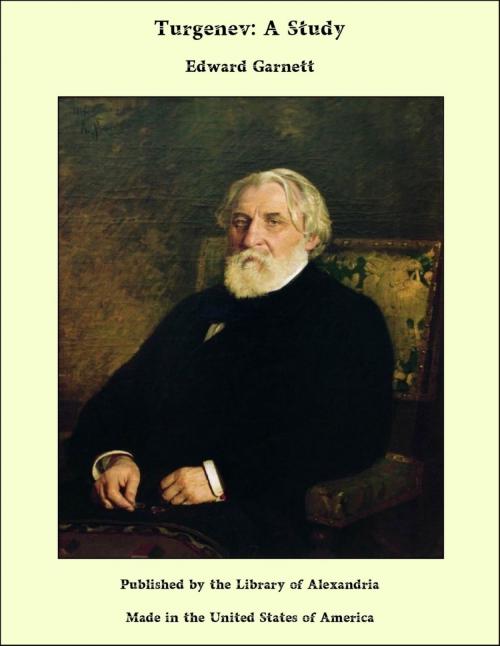| Author: | Edward Garnett | ISBN: | 9781465619228 |
| Publisher: | Library of Alexandria | Publication: | March 8, 2015 |
| Imprint: | Language: | English |
| Author: | Edward Garnett |
| ISBN: | 9781465619228 |
| Publisher: | Library of Alexandria |
| Publication: | March 8, 2015 |
| Imprint: | |
| Language: | English |
A writer, Mr. Robert Lynd, has said: “It is the custom when praising a Russian writer to do so at the expense of all other Russian writers. It is as though most of us were monotheists in our devotion to authors, and could not endure to see any respect paid to the images of the rivals of the gods of the moment. And so one year Tolstoy is laid prone as Dagon, and another year, Turgenev. And no doubt the day will come when Dostoevsky will fall from his huge eminence.” One had hoped that the disease, long endemic in Russia, of disparaging Turgenev, would not have spread to England, but some enthusiastic explorers of things Russian came back home with a mild virus and communicated the spores of the misunderstanding. That misunderstanding, dating at least fifty years back, was part of the polemics of the rival Russian political parties. The Englishman who finds it strange that Turgenev’s pictures of contemporary Russian life should have excited such angry heat and raised such clouds of acrimonious smoke may imagine the fate of a great writer in Ireland to-day who should go on his way serenely, holding the balance level between the Unionists, the Nationalists, the Sinn Féin, the people of Dublin, and the people of Belfast. The more impartial were his pictures as art, the louder would rise the hubbub that his types were “exceptional,” that his insight was “limited,” that he did not understand either the politicians or the gentry or the peasants, that he had not fathomed all that was in each “movement,” that he was palming off on us heroes who had “no real existence.” And, in the sense that Turgenev’s serene and beautiful art excludes thousands of aspects that filled the newspapers and the minds of his contemporaries, his detractors have reason. Various Russian critics, however, whom Mr. Maurice Baring, and a French biographer, M. Haumant, have echoed, have gone further, and in their critical ingenuity have mildly damned the Russian master’s creations. It seems to these gentlemen that there is a great deal of water in Turgenev’s wine. Mr. Baring tells us that Tolstoy and Dostoevsky “reached the absolute truth of the life which was round them,” and that “people are beginning to ask themselves whether Turgenev’s pictures are true (!), whether the Russians that he describes ever existed, and whether the praise which was bestowed upon him by his astonished contemporaries all over Europe was not a gross exaggeration.”
A writer, Mr. Robert Lynd, has said: “It is the custom when praising a Russian writer to do so at the expense of all other Russian writers. It is as though most of us were monotheists in our devotion to authors, and could not endure to see any respect paid to the images of the rivals of the gods of the moment. And so one year Tolstoy is laid prone as Dagon, and another year, Turgenev. And no doubt the day will come when Dostoevsky will fall from his huge eminence.” One had hoped that the disease, long endemic in Russia, of disparaging Turgenev, would not have spread to England, but some enthusiastic explorers of things Russian came back home with a mild virus and communicated the spores of the misunderstanding. That misunderstanding, dating at least fifty years back, was part of the polemics of the rival Russian political parties. The Englishman who finds it strange that Turgenev’s pictures of contemporary Russian life should have excited such angry heat and raised such clouds of acrimonious smoke may imagine the fate of a great writer in Ireland to-day who should go on his way serenely, holding the balance level between the Unionists, the Nationalists, the Sinn Féin, the people of Dublin, and the people of Belfast. The more impartial were his pictures as art, the louder would rise the hubbub that his types were “exceptional,” that his insight was “limited,” that he did not understand either the politicians or the gentry or the peasants, that he had not fathomed all that was in each “movement,” that he was palming off on us heroes who had “no real existence.” And, in the sense that Turgenev’s serene and beautiful art excludes thousands of aspects that filled the newspapers and the minds of his contemporaries, his detractors have reason. Various Russian critics, however, whom Mr. Maurice Baring, and a French biographer, M. Haumant, have echoed, have gone further, and in their critical ingenuity have mildly damned the Russian master’s creations. It seems to these gentlemen that there is a great deal of water in Turgenev’s wine. Mr. Baring tells us that Tolstoy and Dostoevsky “reached the absolute truth of the life which was round them,” and that “people are beginning to ask themselves whether Turgenev’s pictures are true (!), whether the Russians that he describes ever existed, and whether the praise which was bestowed upon him by his astonished contemporaries all over Europe was not a gross exaggeration.”















